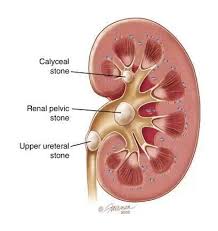Kidney stones also known as renal stones or calculi are the most common cause of urinary obstruction. A renal calculus is a concentration of various mineral salts in the renal pelvis or the cuplike extension of the renal pelvis called the calyx of the kidney or elsewhere in the urinary tract.
They can be small like a grain of sand or very large. Most stones develop in the kidney and are formed from calcium salts, uric acid, cystine, and struvite in descending order of frequency.
Classification:
Kidney stones are typically classified by their location or chemical composition.
Kidney stones by location:
- In the kidney (Nephrolithiasis)
- Ureter (Ureterolithiasis)
- Bladder (Cystolithiasis)
Kidney stones by chemical composition:
- Calcium-containing
- Struvite
- Uric acid
- Cystine
- Other compounds
The hallmark features of kidney stones are
- renal colic,
- hematuria
- and difficulty in urination.
- Pain may be accompanied with nausea, vomiting and fever with chills.






